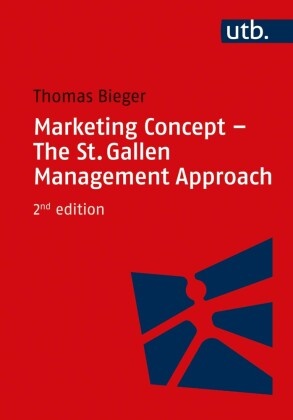Read more
This book presents marketing and business processes as an integral part of the St. Gallen Management Model. It provides a tight introduction into the field of marketing and puts the added value in the center of a market-oriented management approach. The book addresses relevant topics such as market analysis, marketing planning, marketing strategy, positioning, application of marketing tools, product design, price, distribution and communication policy, service provision, innovation and controlling processes.This book aims at students in the first year as well as at practitioners who wants to obtain a quick overview of this field.
List of contents
Table of figures 131 Business processes and marketing concept within the St. Gallen Management Model - an introduction 171.1 Case study Läderach 171.2 Value-creation processes, enterprises and management 201.2.1 Value-creation chains and processes 201.2.2 Organizations, enterprises and management 241.2.3 Enterprise and environment 261.3 Embedding of business processes in the St. Gallen Management Model 281.3.1 Stakeholders 291.3.2 Environment 311.3.3 Environments and sustainability 331.3.4 Structuring forces 341.3.5 Business processes in the St. Gallen Management Model 361.4 Objectives of business processes 381.5 Structure of business processes 421.5.1 Service-provision processes 431.5.2 Customer processes 461.5.3 Innovation processes 491.6 The marketing approach for the management of business processes 511.6.1 Development of marketing 511.6.2 Planning approach in marketing 532 Market analysis as the basis for market-oriented business management 552.1 Case study Mammut 552.2 Customer behavior and markets 572.2.1 Definition and role of markets 572.2.2 Players and market types 582.2.3 Motives, needs, benefit and demand 632.3 Market research objectives and data generation 692.3.1 Identifying market sizes, needs and decision-making 692.3.2 Supply-and-demand trends 732.4 SWOT analysis as a synthesis of market analysis 813 Marketing strategy - from market segmentation to a positioning strategy 853.1 Case study Jura 853.2 Marketing objectives 873.2.1 Corporate objectives and marketing objectives 893.2.2 Interaction of marketing objectives 903.3 From market segmentation to a positioning strategy 933.3.1 Segmentation criteria and segmentation level 933.3.2 Choice of target market 983.3.3 Positioning 983.4 From customer processes to tool strategy 993.4.1 Determinants of tool application 993.4.2 Focus on marketing tool application in the marketing mix 1044 Product design and performance 1074.1 Case study Stadler Rail 1074.2 Product design 1094.3 Performance provision - physical product 1154.3.1 Basic structure of the performance process 1154.3.2 Strategic decisions 1174.3.3 Operational decisions 1214.4 Performance provision - services 1234.4.1 Characteristic features of services 1244.4.2 Performance design and control of the service process 1284.4.3 From service chain to service blueprint 1305 Marketing tool application 1355.1 Case study Jungfraubahn 1355.2 Pricing policy 1375.2.1 Neoclassic pricing model 1385.2.2 Behavioral-science pricing models 1405.2.3 Functions of pricing 1425.3 Distribution policy 1455.3.1 Functions of distribution 1465.3.2 Distribution design 1475.4 Communication 1505.4.1 Role and function of communication 1505.4.2 Organizational scopes of communication 1525.4.3 Communication change 1545.5 Marketing mix 1555.5.1 Objectives of the marketing mix 1555.5.2 Planning the marketing mix 1566 Integration into a business model, controlling and innovation 1596.1 Case study Swiss web portal 1596.2 Integration into a business model 1616.3 Marketing controlling 1646.3.1 Development of a controlling concept 1656.3.2 Characteristics of marketing controlling 1676.3.3 Contribution accounting 1686.4 Innovation 1706.4.1 Functions, roles and tools of innovation 1706.4.2 Return on innovation 1726.4.3 Innovation in models 1736.4.4 Innovation's directions of impact 175Bibliography 179Alphabetical Index 197
About the author
Prof. Dr. Thomas Bieger ist Ordentlicher Universitätsprofessor für Betriebswirtschaftslehre mit besonderer Berücksichtigung der Tourismuswirtschaft an der Universität St. Gallen.
Summary
This book presents marketing and business processes as an integral part of the St. Gallen Management Model. It provides a tight introduction into the field of marketing and puts the added value in the center of a market-oriented management approach. The book addresses relevant topics such as market analysis, marketing planning, marketing strategy, positioning, application of marketing tools, product design, price, distribution and communication policy, service provision, innovation and controlling processes.
This book aims at students in the first year as well as at practitioners who wants to obtain a quick overview of this field.

